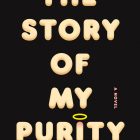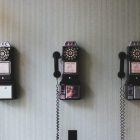Don’t Look at the Comments! Or, Wait, Maybe You Should
Remember the climactic scene from “Raiders of the Lost Ark”? The Nazis are about to open the ark and they have Indy and Marion tied up to that big post and as the ark starts to glow Indy says, “Marion, don’t look at it! Shut your eyes, Marion! Don’t look at it no matter what happens!” Well, that’s always been my philosophy when it comes to Internet comments: don’t look at them, no matter what.
You might be fooled by internet comments for a moment, taken in by the swirling angels singing in what sounds like it might be a gloriously democratized union of voices. You might even be prompted to exclaim, “It’s beautiful!” But, see, that’s just the moment when those angels turn into something else, something horrible, something whose goal is decidedly not enlightened discourse.
Yes, for a long time it was my rule to never sully my eyes and brain with the copious and dubious opinions of the Internet’s more multiloquent readers. But then, predictably, I broke it. I scrolled past the byline. And worst of all, it was my own byline.
I wrote an essay that ended up on a fairly well-clicked site. This would surely be my most read piece of writing, I knew, and the temptation was too much. No, I didn’t just check the comments: I obsessed over them. Every hour? Please. Try every five minutes. And guess what happened?
Okay, maybe it wasn’t quite that bad, though I’m sure my face did drop a bit as I read again and again the volunteered opinions regarding my essay. Despite the majority of the comments being thoughtful and often complimentary, my mind—of course—focused on the nastier ones. This was my first personal encounter with comment culture.
Recently, in an interview at the Believer website, poet and novelist Travis Nichols offered his view of this most modern phenomenon. Nichols has far more experience with commenters than I. He oversaw Harriet, the blog at the Poetry Foundation, and his most recent novel, The More You Ignore Me (Coffee House Press, 2013), takes the form of a very long blog comment.
“Comments are a revolutionary way to monetize hate,” he contends, “so it’s a great thing for people who can just count page views with a clear conscience… I do think comment streams are a reality check for anyone who believes too strongly in the Enlightenment, or in progress.” He directs his displeasure with comment culture at the American educational system, saying, “The most fundamental attack on freedom is the attack on critical thinking skills. Comments display our universal failure to teach and value critical thinking, leaving the possibility open that both everything and nothing could be true.”

Like most discussions of commenters, a good bit of Nichols’ conversation focuses on “trolls.” Thankfully, I haven’t had to deal with any trolling so far. I believe that the comments I’ve read on pieces of my writing have been, to one extent or another, earnest attempts to be a part of a conversation. But one of the facts of online life is that people are sometimes more forceful in their pronouncements, say, than they might be in a face-to-face interaction. Anonymity doesn’t really breed decorum, because there are little to no repercussions for hyperbole and rudeness.
It’s pretty easy to skip the comment threads on most articles and posts we read, and it is even relatively simple to dismiss and forget even the most vile remarks we do see, to shrug them off as the nonsense ramblings of some self-hating loser and move on with your life. But it is a different task altogether to negotiate the relationship between yourself as writer and those commenting on your work.
So: what should a writer’s relationship with commenters look like? It might not be as simple as we think.
I posted a query on Facebook: “Writer people: what are your rules for engaging, or not engaging, with commenters on pieces you’ve written online?”
Most responses ran the gamut from Don’t do it! to No, seriously dude, don’t do it. Some offered elaborations, such as, “Only after a six-pack,” and “If you must read the comments, don’t do it right before bedtime,” and “Appoint a smart, savvy pal to bulldog for you on the comments, if need be. You: stay off.”
A friend pointed me to a Twitter account called Don’t Read Comments, which, according to its own description, “will tweet periodic reminders to not read the comments sections for, well, pretty much anything, ever.” Some of those reminders include “Do something nice for yourself today—don’t read the comments” and “You have time to create something beautiful. You have time to read the comments section. You do not have time to do both.” Indeed.
In a conversation with writer Kyle Minor, he offered this view: “Writers spend hard hours working to craft a piece, and then readers are allowed in the same space to casually dismiss or antagonize the piece in question without putting in reciprocal hard hours. Often, the comments section reflects little to no intelligent engagement with whatever is presumably being commented upon. The exceptions are appreciated by the writer, but the exceptions are few and far between, sadly.”
Hard to argue with that. So, okay, Comments = Bad. We’re all on the same page then, right?
Not so fast, brothers and sisters. One brave soul dissented from the popular view.
Author and artist Quintan Ana Wikswo chimed in on my Facebook thread. “It depends upon the comment,” she wrote, “and the intentions of the commenter, and the nature of the public role the artist envisions for herself. I often interact if I feel it might be fruitful for my own development as an artist-human, or if I feel it’s an opportunity to be part of something meaningful.”
In subsequent messages, I asked her to elaborate on her position.
“To me,” she said, “being a publicly-visible artist in our consumer-driven, celebrity-focused society right now offers a meaningful opportunity to inject diversity into what remains of public discourse. If we don’t speak, if we don’t interact, if we protect and insulate ourselves from the meaningful conversations (wherever they might occur) then we become even more invisible as a force of positive change.
“It astonishes and saddens me that artists will work their whole lives to publish, exhibit, perform, and share their work with public audiences, only to then express distaste for actually interacting with the huddled masses. At worst, it’s an ivory-towered elitism. At best, it’s a lack of confidence that we artists have a worthwhile role in public discourse.”
Hearing it put that way, I wonder if I should rethink my approach. But then I look again at the opinions voiced on the average blog or article, and the style with which they are expressed. I read the sexism and classism and racism. I read the kneejerk politics, the personal attacks, the scapegoating. I read the resentment and hostility toward both author and subject. I can feel my face starting to melt just thinking about it.
I’d like to be more like Wikswo, who says that her “interactions with hostile audiences have been instrumental in [her] growth as an artist.” But I don’t know if I have it in me to mentally and emotionally turn received negativity (as opposed to true criticism, which can, of course, be immensely helpful) into artistic strength.
So (he said, well aware of the irony), what do you think? Do you respond to comments on your work? Should writers be more open to online “conversations”?



